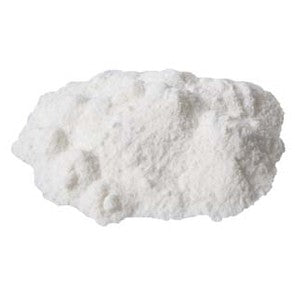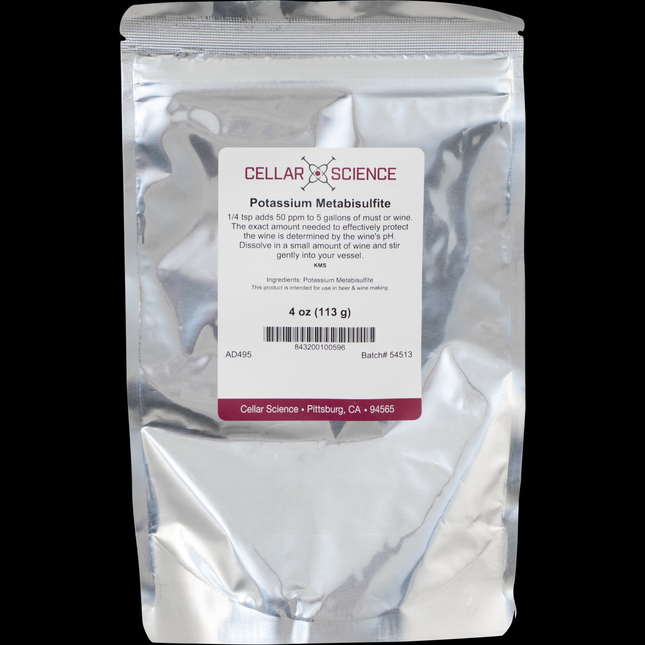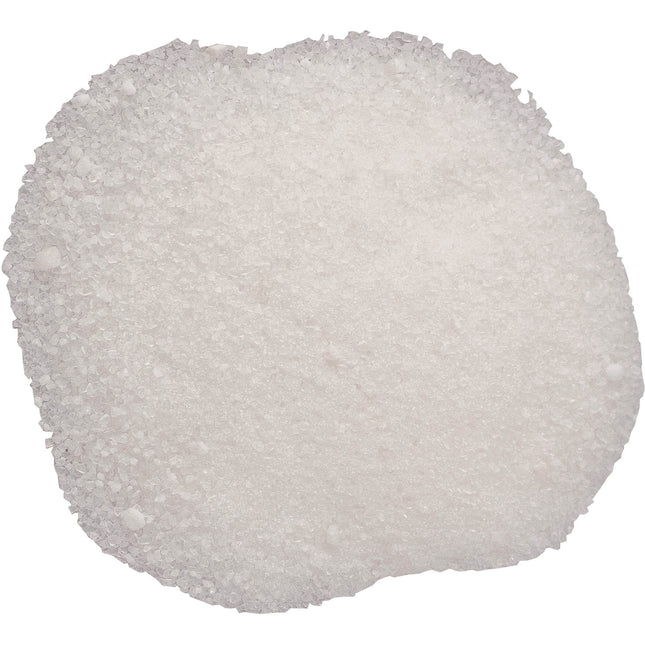Whether you're looking for the right amount of pectic enzyme or noblesse to add to your wine, MoreWine! is proud to offer an extensive selection of wine additives, available in a range of sizes.
Other Additives
-


Potassium Metabisulfite
Potassium Metabisulfite, (often referred to as "SO2", "sulfites" "meta", or "meta-bi") has several uses in winemaking. At the crush, sulfites are generally used to help control the spoilage bacteria and indigenous yeast that may already be present both on the fruit and in the winery (i.e. on the picking bins, processing equipment, tanks, tubing, etc). The amount generally used is enough to inhibit most of the unwanted organisms but not enough to hinder a cultured yeast, which has a higher tolerance to sulfites than most of the indigenous organisms do. This inhibition effectively "wipes the slate clean" for the cultured yeast to step in and rapidly colonize the must so that it can effectively dominate the subsequent fermentation. In addition, sulfites also help to inhibit the enzymatic browning of both musts and finished wines so that all of their delicate complexities can be preserved. Later, during storage and in the bottle, sulfites at the proper levels will further protect a wine by continuing to inhibit spoilage organisms, as well as by scavenging oxygen. Note that the exact amount needed to effectively do the job is determined by the pH of the wine. Refer to our MoreManuals! on Red or White Winemaking or one of the winemaking books that we offer for a complete explanation on how to properly manage sulfites. In addition, it's important to keep in mind that free SO2 levels fall faster in wood cooperage than in glass or stainless, so if you are using a barrel you will most likely need to manage sulfite levels more closely. The most common form of Metabisulfite is as a powder which is fixed with potassium or sodium. 1/4 tsp of Potassium Metabisulfite adds 50ppm to 5 gallons of must. Old Metabisulfite loses potency with time and should be replaced every year to assure that you are getting correct levels. You can use old Metabisulfite to make solutions for sanitizing equipment.
$6.99
-


Lallemand Opti Red | For Color | Body | Tannin Integration
OptiRED – Lallemand Yeast Derivative for Color, Body & Tannin Integration in Red Wines Enhances early formation of polysaccharide–polyphenol complexes for more intense, stable color Rounds and smooths tannins to reduce harshness and astringency Builds fuller body and improved mouthfeel without altering varietal expression Can be used at the start or during fermentation for flexible control over tannin structure Outperforms generic inactivated yeast products by delivering high‑molecular‑weight mannoproteins via MEX™ processing OptiRED is a tailored inactivated yeast derivative produced by Lallemand using an innovative MEX™ method that makes high-molecular-weight polysaccharides immediately available in the must. When introduced early during maceration or alcohol fermentation, these compounds complex with freshly released anthocyanins and tannins, protecting color integrity and creating softer, more integrated tannin profiles. The result is a red wine with enhanced intensity, smoother palate, improved structural balance, and longer-term color stability—without over‑manipulating varietal character. This effect is particularly noticeable in light‑ to medium‑bodied reds or in vintages with lower phenolic maturity. Protocol Suspend the recommended dose in 10× its weight of clean must or water. Stir thoroughly to ensure full dispersion, then add at one of these points: • At the beginning of maceration or alcoholic fermentation for enhanced color protection and tannin integration • Toward the end of fermentation to smooth out persistent harshness without affecting initial extraction. Usage Rates Recommended dosage: 20–40 g per hectoliter = 0.2–0.4 g per liter = 0.76–1.5 g per gallon For standard use, 30 g/hL (0.3 g/L or ~1.14 g/gal) provides excellent balance between color enhancement and mouthfeel refinement. For home users a rough approximate of weight is 1 tsp = 2.6 grams. We highly recommend using a scale to weigh the product for an accurate dose. We do not recommend relying on these rough conversions for accurate dosage rates.
$2.69
-

Tartaric Acid
MoreWine!'s Tartaric Acid is processed naturally in Europe from grapes and is the preferred acid for adjusting acid levels in wine. Be aware that a lot Tartaric Acid available to home winemakers is artificially made, comes from China, and does not integrate into the wine as well. Some of this tartaric includes the designation of "food-grade". Because MoreWine! packages this product you can be assured you are getting the highest winery-grade quality. 3.8g per gallon adjusts acidity by +.1%. As a note: some tartaric acid will drop out of suspension as potassium bitartrate if you are doing any cold stabilization. You might want to re-test total acidity after cold stabilization.
$5.99
-


Lallemand Opti-White| For Freshness | Mouthfeel | Oxidation Protection
A OptiWHITE – Lallemand Yeast Derivative for Freshness, Mouthfeel, and Oxidation Protection in White and Rosé Wines Protects delicate white and rosé wines from oxidation during fermentation Enhances freshness, aroma longevity, and color stability Improves mouthfeel and softness without adding bitterness Reduces the risk of browning and premature aging Outperforms generic inactivated yeasts due to its targeted composition and polysaccharide profile OptiWHITE is a specific yeast derivative developed by Lallemand through a proprietary production method that preserves functional compounds like glutathione precursors and polysaccharides. Added at the beginning of fermentation, OptiWHITE helps protect varietal aromas and prevents oxidative damage in white and rosé wines. This is especially valuable for wines with thiol or terpene-driven profiles, such as Sauvignon Blanc, Riesling, and Muscat. It contributes to a round, full palate with reduced astringency and bitterness, while preserving brightness and youthful aromas through aging. Compared to standard yeast hulls or inactivated yeast products, OptiWHITE delivers a cleaner fermentation environment with more reliable sensory impact. Protocol Add OptiWHITE directly to the juice or must at the beginning of alcoholic fermentation. Disperse in ten times its weight of clean water or must, then mix thoroughly into the tank. Best used before or during the first stages of fermentation. Do not co-add with bentonite or tannins. Usage Rates Recommended dosage: 20–40 grams per hectoliter = 0.2–0.4 grams per liter = 0.76–1.5 grams per gallon For home users a rough approximate of weight is 1 tsp = 3.4 grams
$4.49
-

Pectic Enzyme
Used to reduce the hazing effect of pectin's when using real fruit in your beer, wines, or meads. Mix 2 tsp with cold water and add to 5 - 6 gallon of must before the start of fermentation. Enzymes denature above 150 Fahrenheit (approximately) thus if you are doing any heating of your product add them after the product has cooled.
$2.99
-

Sorbistat K (Potassium Sorbate)
Sorbistat K, Potassium Sorbate, ensures against renewed fermentation in wine when residual sugar is added post the initial ferment. Add at the rate of .5 to .75 grams per gallon (125-200ppm) in conjunction with .3 grams of meta-bisulphite (50ppm) per gallon. Use the higher end of the range (200 ppm) as the wine's pH approaches or exceeds 3.5 or when the alcohol conent of the wine is below 10%. Note: Will not stop an active fermentation. Potassium sorbate should not be used if the wine underwent an ML fermentation because sorbic acid (in the potassium sorbate) will react with lactic bacteria to produce a "geranium" smelling off-flavor. A rough approximate of weight is 1 tsp = 2.3 grams. We highly recommend using a scale to weigh the product for an accurate dose. We do not recommend relying on these rough conversions for accurate dosage rates.
$3.49
-


Enartis Claril ZW | Advanced Protein Fining Agent | Bentonite Alternative
Effectively stabilizes proteins in white, rosé, and sparkling wines, preventing haze without negatively impacting aroma, color, or structure. Offers a clean and wine-friendly alternative to bentonite, providing gentle clarification with minimal volume loss and lees. Allergen-free, vegan-friendly, and non-GMO, catering to modern consumer preferences and dietary needs. Optimizes wine for tartrate stabilization with Zenith Uno, ensuring a stable matrix for efficient and reliable results without filtration issues. Claril ZW is an advanced fining agent specifically formulated to solve protein instability in white, rosé, and sparkling wines—without compromising aroma, color, or structure. A synergistic blend of plant proteins and polysaccharides, Claril ZW is a modern, allergen-free alternative to bentonite, offering gentle, effective clarification with minimal volume loss and lees compaction. How It Works: Claril ZW targets unstable proteins by forming electrostatic bonds that cause them to aggregate and precipitate. Its plant-based protein component offers strong affinity for wine proteins, while the polysaccharide fraction helps preserve delicate aromas and supports color stability. Unlike traditional bentonite treatments, Claril ZW offers a cleaner fining action with a more favorable impact on wine sensory quality. Ideal Foundation for Zenith Uno: By effectively removing haze-forming proteins, Claril ZW sets the stage for optimal tartrate stabilization with Zenith Uno. Protein instability can compromise the performance of potassium polyaspartate (KPA)—but with Claril ZW, you ensure a clean, stable matrix that allows Zenith Uno to work at full efficiency, without filtration issues or precipitation risk. Key Benefits: Highly effective protein stabilization Allergen-free, vegan-friendly, non-GMO Preserves aroma, flavor, and mouthfeel Minimal lees volume and excellent compaction Perfect preparation for tartrate stabilization with Zenith Uno Whether used alone to eliminate protein haze or as a strategic partner in your cold stability protocol, Claril ZW gives winemakers a clean, modern, and sustainable path to stability.
$2.49











